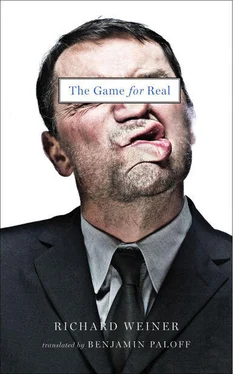Fuld: To all of you?
Giggles: I hear you, my dear, I hear you. Have you erred, since I hear when I shouldn’t hear? Oh my dear, oh my dear, don’t make such cruel jokes.
Fuld (leaning over the table and speaking as if he were reading an invisible inscription there): Giggles, who shouldn’t hear, hears. Giggles, who shouldn’t suffer, does.
Mutig: But she doesn’t hear, it only seems that she does. — Less than a footwrap — to all of us, to all of us, to us who are the meaning of her life, as she says, you know? (Quieter and quieter, and leaning so far across the table that he touches it with his chest): We are having such a beautiful game with her — an innocent game — for her benefit, you know! Voulez-vous jouer avec moi?
What will come next is con sordino . It’s a potpourri of what I know and what I saw, a potpourri con sordino . — A new and dizzyingly rapid change of scenery. The spectators, all of them together, have quietly stood and are leaving in a slow and orderly fashion. At the exit, spectacular demonstrations of courtesy. The hall has emptied out. The air is suffused with ozone. It is no longer so much a hall as a spacious room. It is empty, and a low stool, like that of a shoemaker, has been brought into the middle. There’s a blackamoor sitting on it. He’s almost squatting, his knees spread wide. His teeth are shining, he’s giggling quietly.
Mutig: For her benefit, you know, however much it may seem otherwise: for this game, one might say, is cruel.
At these words, the black man has stood. He’s picked up the stool, he’s moved over. He’s stood next to Mutig — giggling like that all the while — he’s put the stool down, but he hasn’t sat on it again. Mutig puts his arm around his neck like a buddy, and in a tone of light conversation:
“Giggles! What she really is is a corpse, you know. And I can’t drag a corpse through life. It disgusts me, and she terrifies me. And anyway, there are better things to work at than dragging corpses. I have better things to say, by which I of course mean vanities merely of a more splendid variety. — What, she doesn’t quite strike you as a corpse? Then you still don’t know everything. You couldn’t imagine how we treat her, my friends and I. She doesn’t even react anymore. That is, she reacts in her own way: she interprets our scorn merely as a difficult test she’s being put through. Perhaps it really was just a test at first. Not something she was supposed to suffer, the dummy. She was supposed to hold herself high. A test we’ve consented to — oh, the little lamb! — a test we’ve consented to becomes irrevocable, eternal; it solidifies. It’s the solid eternal (now you understand why I refute eternity?), an eternal that is more and more solid. Giggles had nothing left, nothing. We stripped her of everything. That is. . There was one support, one hope. Just one. — As I told you: ‘As long as Fuld doesn’t think I’m damned. .’ Are you beginning to understand what I need you for?”
Fuld: I’m hardly a professional killer, am I?
Mutig: And who says that it’s therefore inevitably you who’ll do the killing?
Fuld: If she’s crossed you so bad, you’ll knock her off. Knocking someone off! It’s not so hard. (Hastily.) Are you a Christian? It’s not like you’re a Christian, is it? So then why the pussyfooting around the people we’ve put a button on? You’re too noble. She’s dead, so she’s foul. But you, Mutig, are disproving yourself by remembering; you remember that this dead girl was living through you, right? You don’t want her to be foul, or a dead girl, either. Aren’t you looking for a way to provide her with an opening for rehabilitation? Because she’s your dead girl, right? Killed by you, right? You’re not perfect yet, Mutig, you really aren’t.
Mutig: Oh, you’re a sharp one! Yes, it’s a matter of her rehabilitation. I’m not pretending to be better than I am. Maybe I want it out of cynicism — her rehabilitation, that is — so I wouldn’t have to feel ashamed that I ever mistook a woman capable of falling so low as worthy of myself. Take all of her hope, including the last she has left, her hope in you, and she’d gain her freedom — get it? Do you follow me? Then there wouldn’t be anything left to hold her back, there would no longer be anything to use as a pretext for tolerating a scorn so difficult and (in a whisper) eternal! Maybe then she would be rehabilitated again in our eyes; maybe she would be truly happy again. — You see, my friend, it’s actually for her that I’m praying. If only she could react not in her own way, but the way we, her alleged gods, expect her to!
Fuld (a long time before he responds): React. — Sure. . react. — Just what do you mean by that?
“I don’t know exactly,” Mutig answered lazily and somehow affectionately, “I don’t know. Maybe that — seeing how it’s the end of everything, everything — maybe that she’d leave— that she’d retire — move on to greener pastures.”
Fuld (with a focus that, after sort of roaming long and tenderly, suddenly reared its head): To greener pastures? — To greener pastures. (With feigned joy at having solved a tough riddle:) That she would leave you? She, you?!
Mutig (to the blackamoor, to his face): Yes, that she’d leave me.
Fuld: In other words, you want to win, but through defeat. What a stoic!
Mutig: A stoic! — Oh, to greener pastures — but you know.
Fuld (quiet, he looks askance).
Mutig (affably): Naturally. — Giggles is lower than a footwrap. Imagine, for example, that she were killed. She’d be rehabilitated by it.
Fuld (slowly and reflectively): But does Giggles’s death matter. . She can’t hear us, right?
Hardly had Mutig given an offhand “But of course she can’t hear us” when he jumped up: “What now, Giggles, have you lost your mind?”
Giggles’s head had fallen to her chest, an invisible hand had swept the life from her little face, but it forgot to do away with the smile. Giggles collapsed. But Mutig took her and set her on her feet like an ill-supported doll.
Fuld (continuing as he watched with indifferent attention): If Giggles’s death is up to me, then what’s there for you to brag about?
“Pardon me, sir,” Mutig replied with an imperious smile, “but all the same, we who now struggle are but five. My friends and I. We are not so petty as you think. The power over lives is indivisible, a sixth is like the whole. Is that not enough for you?”
“How do you proceed?” Fuld asked, as it were, expertly.
Mutig’s hand pondered for a moment. Then slowly, like a leopard, it started to stalk across the table. It was the genuine stalking of a leopard ready to pounce, and then it did. And once it did, it darted. Mutig’s clenched fist was its maw, and in that maw — a rubber puppet; vertically, terribly. — But Mutig’s mouth, slack, pronounced: “ Jettatura .”
“Jettatura,” the Negro repeated, eyeing the puppet closely, as if spying its sclera. He and Mutig turned fully toward each other, embraced like old friends, and the word “Jettatura!” which they spoke to each other’s faces, drained the color from their cheeks and the lips that had pronounced this word, as if in doing so they’d forever lost all memory of what it was to smile.
“Don’t think me crazy, Fuld. We had no wish to enchant by black-magic practices, though there might have been something of black magic there. Our aim was for a pure result, from our non-occult powers. This doll here? A mere record of our achievements, let’s say. A sort of book of work to be done as well: we have committed to demolishing every single part. So let’s get down to work, and no excuses, right? — I’ll explain it to you. — Here, for example, we have the eyes. They’re transfixed. Why are they transfixed? Because there’s no point anymore. Because they’ve lost their power. Giggles’s poor eyes! To think how they once reigned. — At the time of our first love, they were promise-grateful. There’s no other way I can put it: promise-grateful. You would have sworn they couldn’t give enough, and that in their thanksgiving there would forever gleam a spark of agitated regret at not having expressed all there was. They were steadfast in their promises, these eyes, defiant and proud in their gratitude. Already back then, this runaway figurante from the Folies-Bèrgere could see she was heading for disaster, but she saw it with such steady rage that the horror passed her by. — Fine. After our second love, too, they were drowning in iridescent fluid, and they were promising, and they were giving thanks. They were honest in their promises, but like a banker before a no-fault bankruptcy, when he doesn’t know whether he’ll actually be able to keep them. They were recalling the defiant and insane promise from before, they were comparing, they were realizing , they were calculating the possibilities and my insatiable demands. They were trying to look honest, which is why they looked stupid. And they gave thanks. But sometimes one gives thanks because it’s shameful to beg. I might have overlooked that if, after our third , they weren’t just pleading. I didn’t yet suspect that I was already her master, and her pleadingly grateful eyes now gave her away. After the fourth , she disbanded all her armies; but what did she have to begin with? Words are a dame’s reserves, but they can’t manage them. She said — I’m ashamed to repeat it, it was so banal — she said: ‘I can’t live without you.’ And that’s how people dig their own graves! I’ll explain it to you. It had evolved into a game — evil, innocent, I don’t know, but it had dropped right into our lap. People accuse us of hatching a plan to drive her methodically to suicide. A laugh.
Читать дальше












